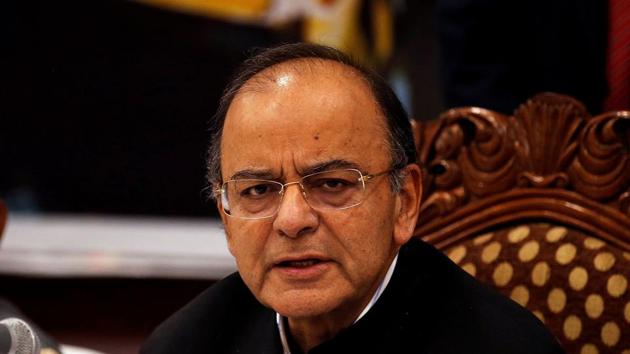Essential politician: The importance of being Jaitley
Writer Patrick French profiled Arun Jaitley for Hindustan Times in 2015. Here’s an abridged version.
Arun Jaitley is something of a paradox. As a Lutyens-compliant minister in a government of Delhi outsiders, he is gossipy, sociable, busy, always at hand to firefight whatever crisis, real or imagined, might be exercising the public, investors or the media.

Yet to see him only as a plausible lawyer making a skilful case on behalf of the ruling power is to ignore the longevity of his attachment to the Bharatiya Janata Party and its forebear the Jana Sangh. How did he come to be there? The answer lies in two places: his family, and his experiences during the Emergency. “We were a Partition family,” he says. “They had a nostalgia about Lahore and disliked Pakistan for having taken Lahore from them. It had left wounds. Families who suffered at Partition were conventionally Jana Sangh voters. They were critical of Nehru and even more of Indira. I remember my father thought they had suffered because of Nehru.”
Jaitley’s newly-married parents had reached Delhi as refugees in August 1947. Born in 1952, he says he had a protected childhood. But it was not easy. “Have you ever seen a Punjabi beggar? Punjabis as a community are an aggressive lot. They made shops on the pavements. They set up ‘camp colleges’. At that time, the High Court was in Simla and the Bar was divided between local lawyers, who were Banias and Kayasths and a few Muslims, and newcomers known as the ‘refugee bar’. Some, including my father, got offices in Chandni Chowk or Sadar Bazaar. Education was a top priority because of the Brahmin thing of my grandmother. My sisters and I were sent to convent schools, English-medium.” In the 1960s his father bought a small plot and built a house in Naraina Vihar.
It was in the courtyard of this house, on the night of 25 June 1975, that Arun Jaitley spotted a policeman speaking to his father. He was at the time an activist in the Akhil Bharatiya Vidyarthi Parishad, and had been picked by JP as the convenor of his youth committee. “I escaped out of the back door.” The next day, as president of the student’s union of Delhi University, he organised one of the only protests in the entire country.
It was in the aftermath that he forged his political career. “In January 1977 I was released and plunged into the election campaign. I was the national convenor of the youth and students. I travelled around India. Lalu, Sharad Yadav, Nitish, Karat, Yechury, Parkash Singh Badal, JP himself, Acharya Kripalani, George Fernandes, Advani, Vaypayee, Nanaji Deshmukh – I have dealt with almost every one of them...”
Forty years on, wrapped in a jamawar while addressing the Rajya Sabha, having made plenty of money as a senior advocate, it can be easy to forget this tough side of Jaitley. The connections he formed early on stood him in good stead later. He says he first met Narendra Modi in the 1970s, “when he was studying in Delhi,” and was struck in the 1990s by his “organizational competence.”
“In 2011, I told colleagues he will be the prime ministerial candidate.”
Unlike many politicians, Jaitley does not take argument personally. When I suggest he may be a good communicator who lacks strong convictions, he says: “Communication skill is an asset, not a liability.” But does he share the ideology of his colleagues? “I am socially wedded to the middle-class family values of India, strong traditional family values. I am economically liberal. I’m conservative on issues dealing with sovereignty, terrorism and separatism. Then on the gay rights issue, I was one of the first people in the BJP to speak on this subject. If millions practice an alternative sexuality, then can you say it’s against the order of nature? On caste and religion, it is a matter of freedom of choice – I have a big heart. In my family even when children marry, we don’t ask the caste or community.”
Does he believe in God? Jaitley pauses. “My mother was religious and my wife is very religious. We have a temple in the house with multiple gods, portraits of the Golden Temple and all of that. I’m a practising Hindu but I’m not ritualistic. I do it at formal functions. I follow the customs.”
I ask him what he would regard as his greatest weakness, and he goes off on an extended riff about his favourite dishes. “I was originally a great lover of food but I have health limitations now. My preference is for north Indian food. I like Kashmiri, Punjabi, the Old Delhi food. I like Gujarati, and the South Indian snacky food. And I very much like the old club menus, the legacy foods. Continental is otherwise not my great favourite. I like Chinese and Thai, among the internationals. But these days,” he says wistfully, raising his right hand to the sky with its fingers splayed, “I even have to carry my own food on aircraft, for health reasons.” When I asked about your weakness, I say a little awkwardly, I meant your weakness as a person. For the first time, Arun Jaitley falls silent. He tries to think of a weakness, and then gives up.
“I’ve never thought of it.”





